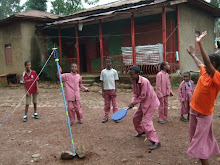I started working with the students at the school today, with Session 1 of the Water Project. The Water Project is an educational project in partnership with Groundwork, a sustainability charity based in the UK. Children in the UK and children at my school in Lalibela will learn about water, and make art work to represent the role it plays in their life. They will then share their ideas and artwork, including exchanging photos they have taken of water and their school and home.
Session 1 for my children was learning about England. These children genuinely have no concept of a world outside their village – only one child out of the 100 I worked with knew that Addis Ababa was their capital city – so they have no idea what England is like. Consequently there were many answers that made both me and Ab, my colleague who was translating, laugh out loud. Here are a few:
Me: Are people who live in England Abesha or Faranji?
Student: Faranji
Me: And what colour is Faranji's skin?
Student: K'ai (red)
Me: (thinking about my sunburnt skin!) Yes, yes, I know my skin is red, but normally what colour is Faranji's skin …
Me: What do people eat in England?
Girl: Um … biscuits … manaman, manaman, manaman (whatever, whatever, whatever)
Me: What's in this picture?
Student: A tree
Jenny: Exactly. And what's on the tree? (pointing to the snow covering the branches)
Student: Clouds!
Me: (pointing to Ethiopia and England on the map) So we know Ethiopia is here and England is here – if I want to go home, how can I get there? Can I walk?
Boy: If you're fit, you can.
Bless their hearts!
These children that I'm working with are very, very different to those at the orphanage, not just in situation but in attitude and knowledge. Both groups of children are – by our standards anyway – poor, but the children in the orphanage are much more wordly wise. Partly, I guess, because of the things they've been through (which I wouldn't wish on any child) and because they are living in a fairly diverse capital city. They live in close proximity with a lot of other children from different races, religions and family situations, so they learn to accept everybody. The children at the school live in the tiny community they were born in, have barely any contact without anyone outside their village, and certainly never mix with anyone from a different race or religion in any meaningful way. This is shown in the bewildered looks on their face when I ask them where Ethiopia is on a map, in the girls who hide their face when anyone asks them a question, or in the confusion when they try to understand that there are children in England, and that they go to school just like them.
I'm hoping the Water Project will be the beginning of the children realising there is a whole world out there that they can learn about – and ultimately, be part of.
This blog expresses the personal experiences and opinions of the author and not of any other person or organisation. The text herein is subject to change at any time, without notice and may not, under any circumstances, be reproduced (in whole or in part) without the author's written permission.
Subscribe to:
Post Comments (Atom)




1 comment:
Ahhhh... hearing those stories makes me really miss Ethiopia! Check this place out while you are in Addis Ababa...
http://www.wattsmith.com/awesomevideos
Watt Smith
Post a Comment